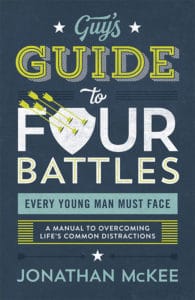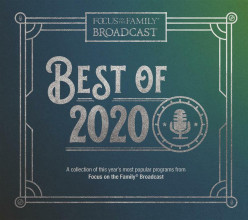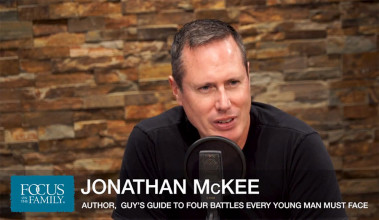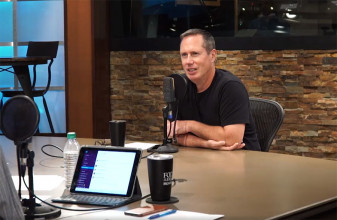
The War of Words
In this Adventures in Odyssey drama, a carelessly uttered word from Eugene creates havoc as it becomes the fashionable insult, resulting in a lesson about the power of words.
Home » Episodes » Focus on the Family Broadcast » Championing Your Son Through His Battles
Excerpt:
Jonathan McKee: And the key thing is to find ways to get into our kids’ world, spend time with them. Maybe that means sitting downplaying video games with them. You know, doing what they like to do, and hang out with them and look for those opportunities to just enter their world, love on them, and engage in meaningful conversation about the stuff that matters. The more we invest in them, then they’re gonna navigate some of these conversations with you, and that’s where values are passed on.
End of Excerpt
John Fuller: Jonathan McKee is with us on this Best of 2020 Focus on the Family broadcast. And your host is Focus President and author Jim Daly. Thanks for joining us, I’m John Fuller.
Jim Daly: Hey, John. Here’s a declaration. Being a teenager is never easy. Although, I’d kinda like now to go back to being a teenager. If- if I had this capacity today-
John: What year would you pick? What age?
Jim: Oh, I don’t know. Definitely not the freshman year. (laughs)
John: Yeah, I would agree.
Jim: Low man on the totem pole.
John: (laughs)
Jim: But, I mean, it’s just tough when you’re tryin’ to figure out who you are, what you’re about.
John: Mm-hmm (affirmative).
Jim: Is your faith your own or is it your parents’? All those things, and, uh, you know, all the other stuff that culture’s throwin’ at you. Social media, pornography. I mean, there’s so many things now that are readily available, uh, to teenagers, and particularly teen boys. And we’re gonna talk about that today. Let me remind you that Focus is here to help you in your parenting journey. There’s nothing that will embarrass you if you call us. And we want you to call us and ask for help if you’re in that place where you really need some input about parenting teens today.
John: Yeah. Our- our phone number is 800-A-FAMILY. And online you can find the help you need at focusonthefamily.com/broadcast. And, uh, Jonathan McKee is an expert on this topic. He was once a teen boy, and-
Jim: (laughs)
John: And he has done 20 years of youth outreach and youth ministry. And he’s written a number of books. He’s been here before a number of times as well. His most recent, uh, topic is A Guy’s Guide to Four Battles Every Young Man Must Face.
Jim: Jonathan, welcome back to Focus.
Jonathan: Ah, thanks for having me. Always a delightful conversation.
Jim: Okay, you’ve heard that intro. Uh, what do you think are the biggest differences between the way maybe we grew up… You’re a little younger than me, but I… you probably still grew up in an era where things were a little simpler compared to what teen boys are growing up with today.
Jonathan: Absolutely. It could be summarized by just saying, um, more accessibility and less accountability. That’s the big difference.
Jim: Oh, that’s good.
Jonathan: Because, I mean, when we were all growing up there was temptations all around us. I mean, the- the- there was definitely raunchy music. There was definitely pornography available. But like pornography, I mean it was a friend showing us his dad’s magazine or it was at a liquor store-
Jim: Right.
Jonathan: … down an aisle somewhere, and- and maybe that was a temptation for some of us, but it wasn’t coming through every WiFi signal in the house.
Jim: Yeah.
Jonathan: Today, there’s more accessibility. Same with music, same with movies. I mean, sure, we could sneak into a movie theater or go rent that movie, right? We had to sneak to the video store, convince the guy to actually give you the R rated movie. Of course, none of us ever did that, but if by chance that was us that was what it was like back then. And now it’s coming again through all these different signals, through these devices that are right there in our bedroom. And sadly, most parents allow these devices into the bedroom so there is the less accountability.
Jim: And that’s the overarching truth right there, and that’s what makes it so difficult for parents today. Uh, especially moms, I think, that worry terribly-
Jonathan: Yeah.
Jim: … and understandably about what their boys are seeing, and going through, and experiencing. Let’s start on a little higher side. And what I mean by that is kinda the overview. You… In your book A Guy’s Guide to Four Battles, uh, you talk about a man sometimes but certainly teen boys too, our lack of ability to ask for directions or instructions. (laughs) That’s me.
John: It’s universal.
Jim: Do you ever read the instructions, John?
John: I-
Jim: You’re firstborn.
John: I try first to-
Jim: (laughs)
John: … do it myself, and then if I need to, I look at the directions.
Jim: I don’t think I’ve ever read a set of instructions puttin’ something together, which does mean I leave a few parts out, but… (laughing)
John: Well…
Jim: Why is that-
John: Yeah.
Jonathan: It is.
Jim: … the case?
Jonathan: It’s- it’s- it’s our stigma. It’s part of being a man, right? You gotta just… You gotta man through it, and so I talk about that ’cause I think that tends to be a tendency. It’s a pride thing with us as… with guys, and- and, you know, sadly, uh, if we go through this journey of life, uh, without looking at the manual, you know, we need to be in the word of God. And so, that’s one of those things that I talk with young men about, uh, and I- I use the story of using a manual to tal- to talk about that and bring that to light because it is kind of a humility thing. It’s- it’s-
Jim: So, it’s pride that keeps-
Jonathan: Yeah, yeah.
Jim: … us from doing it?
Jonathan: Absolutely. It- it’s one of those things where we need to realize ’cause so often as we’re facing these things our tendency is to keep it secret, to not tell anybody, to try to do it on our own, as opposed to doing what the word of God says, which is reach out to others. And in a world full of explicit lies to look in the explicit truth of the word of God. And that’s the place we need to go, so this book, you know, is one of those excuses to get guys digging into the Word.
Jim: Uh, video games. You mentioned that and, uh, how you use it to teach your boys about learning from other’s mistakes. Uh, you gotta tell me how to do this one.
Jonathan: Well, yeah. No, no.
Jim: (laughs)
Jonathan: I mean, obviously, I mean this is one of the huge subjects is we’re talking with the four battles, these four distractions in young people’s lives. Uh, probably the biggest complaint I hear from parents at my parent workshops is, “How do I get my son to stop playing Fortnite,” you know, or Apex Legends, or whatever the game is at the time, you know, “all night long? I cannot pry them from that.” And you guys have sons. You can probably to relate that.
Jim: I mean, we’ll be the golden answer.
John: “Just one-”
Jim: Everybody’s waiting for it.
John: “Just one more minute, Dad.”
Jonathan: Yeah, yeah. Exactly. “One more- one more day, Dad.” And, uh, it’s just it’s one of those things, and so, yeah, I used a video game example of talking. It’s something that all young men understand and it- it’s the fact that very often we’ll go through, like, you know, if you’re playing a video game and you- and you go through a room and- and all the sudden you g- go through a door and you get demolished by a bunch of bad guys, right? And it happens. Well, immediately the cool thing is if… in a video game if you die it just says you’re dead and it puts you back to that next… that last starting point. You know?
Jim: Right.
Jonathan: Where you were, and you just get to have this nice little do-over. You know? If only life
were that simple, right? And the thing is, I’ve never seen a young man go, “Hey, let me- let me go do that same stupid mistake again.” We… They learn from that mistake. They’re- they’re better equipped to walk through that door or avoid that door altogether. And it’s one of those things where we can learn, we can see, and- and here’s the other crazy thing. Guys always play together, right? They’ll- they’ll play, and they’ll see a buddy go through a door like that and they think to themselves immediately, “Well, I’m not gonna go through that door.” Well, this is great life application for us. This is the exact same stuff we can do in life is we don’t have to go out and say, “No, I- I better learn this for myself. Let me drink myself silly.” I mean, we can see this stuff happen and learn from this.
Jim: You know, y- you’re not saying this, but what I like about what you’re saying, and I would- I would ask moms to think about this because I think moms struggle a bit more with this, and I’m sure a few moms have gone a- after Dad. But to use the kids’ environment to teach a lesson. Not to say, “Stop.” But to say, “You know, son, what is this teaching about life?”
Jonathan: That’s all.
Jim: I mean, you can make it a little more playful, but I enjoy that kind of parenting. I… You know, and I… But I think sometimes, um, men may get that a little quicker to engage a son with what he’s doing rather than say, “Stop doing it, and here, I’ll tell you why.” But to engage them in- in their activity and begin to give them a- a short lesson about what that’s teaching, I like that, but I wanna make sure we all catch it.
Jonathan: No, Jim, that- that’s one of those things where we have the opportunity to as we’re entering their world and walking through life with them to be able to have a meaningful conversation about something that matters. And our tendency sometimes as parents is to quickly overreact. If we see our kids playing too many video games, it’s we- we go to the boundaries. We quickly, “Hey, you’ve had too many hours of video games. As opposed to instead of overreacting, interacting. Maybe playing that video game with their kid-
Jim: Mm.
Jonathan: … because when we enter their world and actually, you know, go to play with our kids, I found that my son talked-
Jim: (laughs) I find that very embarrassing.
Jonathan: Yeah, yeah. It- it can be ’cause, you know, they- they kill us all the time.
John: Yeah. I hear what you’re saying.
Jonathan: But the fact is those are some of the best times, and we’ve talked about that before on the show. And to be able to have those moments to have those conversations, that’s powerful stuff. That’s where values are passed on.
Jim: Uh, Johnathan, I love the way you have that introspection about yourself. And in the book, you put it out there. You don’t hide your own shortcomings. But you mention a hilarious story, which probably at the time wasn’t too funny. Uh, but it was a- a- a distraction. It had become a distraction in your life. What was going on?
Jonathan: Yeah. You know, it’s- it’s one of those stories that I think, uh, young people i- identify with just because it’s one of those silly moments, and I- I love-
Jim: (laughs)
Jonathan: I love mountain bike riding, uh, but I’m not what I would call a mountain bike rider by any means. Uh-
Jim: That could be dangerous. (laughs)
Jonathan: Yeah. Uh, I mean, I- I love to be on a mountain bike with my friends, but I- I have friends, like my friend Mark, who, man, this guy, he will take any terrain, anything. So- so, I actually went mountain biking with my friend Mark and, uh-
Jim: (laughs)
Jonathan: And we went up towards Lake Tahoe and Lake Tahoe’s gorgeous. It’s right there in the Sierras. And I knew this particular trail we were gonna take was kind of a precarious trail, and he warned me about it, and so right before we- we go out, he goes, “Okay. Now, Johnathan, listen to me if you don’t wanna die today.” And I go, “Okay, you’ve got my attention. I- I don’t wanna die.” He goes, “Now, here’s what you do.” He goes, “This trail goes back and forth. It’s really crazy.” He goes, “Keep your eyes right on my hub.” He goes, “When it goes left, you go left. When it goes right, you go right.” He goes, “Keep your eyes focused right on that one thing and you won’t die.” And I said, “Okay. Keep my eyes on the hub, don’t die.” And, man, he was right ’cause when he took off on this trail, man, he was going all over the place. And when he went fast, I tried to go fast. When he slowed down, I definitely slowed down. Right, I went right. Left, I went left. And it was a crazy trail. And, man, I was so glad to have him guiding me and I kept my eyes right on the hub. But we finally came around this clearing and off in my peripheral vision, I could see this amazing blue something to my right and I realized it’s Lake Tahoe. And if you have never seen Lake Tahoe it is the most gorgeous-
Jim: It’s emerald. Yeah.
Jonathan: It is the most gorgeous deep blue you have ever seen, and I was just thinking, “I- I’m just gonna take a little peak,” ’cause it’s this beautiful and he’s not stopping, and this is the perfect place to stop. So, I just… I couldn’t help it, and I remember, “Look at the hub or die. Look at the hub or die.”
Jim: (laughs)
Jonathan: And I was like… I just couldn’t… I was like, “But it’s so beautiful,” and I just looked over to the right over there and I was like, “Oh. Wow, how beautiful,” and the trail turned left. I didn’t see it. I went right off the edge. True story. Literally, just right off the edge and luckily there was this little Christmas tree just kind of right… And- and ’cause it was one of those edges… I don’t think I would’ve died, but, man, I would’ve broke some serious bones. I reached out and I just grabbed the Christmas tree like Elf, man.
Jim: (laughs)
Jonathan: I just grabbed that thing and the Christmas tree just dipped and went…
Jim: (laughs)
Jonathan: And I was like, “Hold on little tree.”
John: (laughs)
Jonathan: You know, and I sat there, and I was dangling onto this tree. And it was so funny ’cause, I mean, there’s nothing wrong with looking at a lake. But the fact is sometimes in life there’s distractions that keep our eyes off the focus of what we should be focused on. And it was one of those moments where I realized, “Hey, you know what? There’s distract- There’s nothing wrong with video games.” You know? There- there’s things in our life that sometimes are distractions and keep us from focusing on the things that matter, and that’s one of those illustrations I give in the book where we talk about, “Hey, how do we stay focused on the things that matter?”
John: Mm-hmm (affirmative). Jonathan McKee is our guest today on Focus on the Family. And he’s got this great book, Guy’s Guide to Four Battles Every Young Man Must Face. And we’ve got it available here at the, uh, ministry and we invite your call. 800-232-6459. 800, the letter A, and the word FAMILY. Or you’ll find the book and other help at focusonthefamily.com/broadcast.
Jim: Jonathan, uh, we’ve been talking about these four battles-
Jonathan: Mm-hmm (affirmative).
Jim: … that young men will face. We haven’t really named ’em, so what are they?
Jonathan: Absolutely. Uh, sexual temptation, screens, controlled substances, and struggles with self-esteem.
John: Uh-huh (affirmative).
Jonathan: Those are the for biggies. Those are the ones that-
Jim: Mm-hmm (affirmative).
Jonathan: … guaranteed if a mom comes up to me and asks a question about her son and says, “Hey, I- I gotta ask you, my son,” I know it’s gonna be one of those four things.
Jim: Yeah. I would think, um, you know… Again, being a dad of teenagers, I would think that self-image is kinda the foundation there because the other things behaviorally come from poor-
Jonathan: Mm-hmm (affirmative).
Jim: … self-image and impact on your self-image or wanting to be something special in the crowd, what have you. Self-image, what are the obstacles there? What are the battles? How do we encourage a teen boy in his self-image?
Jonathan: No, it’s a great question. Especially because these four battles seem to intertwine so much. I mean, ’cause self-image is now so tied up in screens. And so, in a world where screens are becoming such a distraction… I mean, and this is- this is kinda new territory for us as parents because when you look at the greater history of mankind, I mean, we’ve really only, you know, a- as a country only had smartphones in our pockets for, like, the last like seven years. So, this is kinda new stuff where young people are carrying social media in their pocket. I mean, ’cause it really wasn’t ’til 2012 that- that Snapchat, and Insta, and all this stuff emerged, and since then every expert out there is pointing to this social media and these devices in our pockets as the source to all the problems with anxiety, depression. You know, the- their self-esteem is so caught up in this little… I call the smartphone a little barometer of self-esteem. And if you think about this, for a guy today it’s like, “Well, how many friends do you have?” A lot of them would, “Well, let me check real quick.” They go right to their device.
Jim: Sure.
Jonathan: “I’ll tell you how many friends I have.” You know?
Jim: Right.
Jonathan: You know, “How am I trending right now? What crazy thing have I done to get likes?” You know, and so this is a sad situation for… And- and honestly, everybody’s trying to kind of figure it out right now. Um, our country’s in- in a spot where we saw both Apple and Droid last year just recently come up with all the sudden screen time limits and stuff for the first time because there was this outcry of, “Hey, something’s wrong here. Young people are getting so caught up in devices.” Uh, scratch that. Not young people. People-
Jim: Right.
John: Mm-hmm (affirmative).
Jonathan: … are getting so tied into these devices, and so that’s one of the big struggles right now is helping young people realize that their identity is so much more than just the likes you receive on Insta. (laughs)
Jim: Yeah, and, you know, the application, again, nothing new under the sun. Jesus spoke a lot about a person’s image, and self-image, and those kinds of things. So, how do you take the way Jesus spoke about self-image and parlay that into a real-world experience with your teen boy today?
Jonathan: Well, in a world where everybody wants to be liked, I think a lot of us, you know, we’re- we’re going for attention in wrong ways. And Jesus was such an amazing example of someone who just cared for others. And I love just when you read Jesus’s stories, the way Jesus treated people, there was some people that I think a lot of young people can identify with today. Zacchaeus kinda maybe made some bad choices, maybe not liked by the crowd, but yet Jesus just called out and said, “Hey, Zach. Let’s do dinner tonight. I wanna hang out with you.” And Jesus cared about Zach because of just the fact of who he was. You know? And it didn’t matter about his past, but his future was incredibly important to Jesus.
And this is one of those things where young people, again, we can get so caught up in our identity and- and- and how many actual likes we have on Instagram or- or whatever. And our identity as a believer is in Christ. And it’s so neat. The more we get to know Jesus and the more we get to know how much he values us and wants to get to know us, that is such a comfort-
Jim: Yeah.
Jonathan: … to young people. And then there’s many other ways we get into in the book, such as serving, and this, and that. Because it’s amazing, when you start serving and seeing sometimes where other people are in need and the difference that you can make in someone else’s life, man, there is no greater boost to self-esteem when God is using you to impact others.
Jim: Well, and you mentioned these four things are intertwined, and-
Jonathan: Yeah.
Jim: … just for people jumping in right now, self-image, screens, sexual situations, substance abuse.
Jonathan: Yeah.
Jim: Those are the four core things you cover in your book, Guy’s Guide to Four Battles Every Young Man Must Face. Um, let me mention that social media component and how it works in our self-image area.
Jonathan: Mm-hmm (affirmative).
Jim: And I think, again, we play down gender in this culture, but gender has a role here. Boys and girls seemingly respond differently to social media and self-image. So, describe those differences. How do teen girls and teen boys differ when it comes to social media impact?
Jonathan: Yeah. No, no. I mean, there’s definite difference between the genders, and- and a lot of parents here, especially parents of younger boys, you sit and say, “Well, my boys aren’t even interested in social media. They’re interested in video games.” Right? Well, it’s interesting because most young people when they’re playing video games have a headset on and are connecting with someone else, and that’s actually kind of a social media there because you’re chatting with, sadly, very often, a stranger.
Jim: Mm-hmm (affirmative).
Jonathan: And we’ve talked about that in past broadcasts. But where girls, for sure, very often it’s that connecting, you know, uh, going through that Instagram scroll and- and looking at what others are doing. But it is interesting because, uh, don’t discount the fact that guys really do also then, you know, when they’re done playing video games and stuff, they do often go to that social media feed because social media, it’s just a reality of how young people connect with each today. It- it’s- it’s a playground.
Jim: Yeah.
Jonathan: It- it- it’s a place where people get to know each other, where they try to measure up, um, you know, it- it’s… There’s a pecking order on social media. And so, this is where young people kind of navigate and communicate, and very often if something happens it’s portrayed on social media. If you wanna embarrass somebody, take a picture of ’em, post it on social media.
Jim: Yeah.
Jonathan: This is the playground of today. It’s… And that’s why we need to talk to young people about this and equip them for this journey on social media instead of just throwin’ them the car keys and saying, “Good luck.”
Jim: Mm-hmm (affirmative). Uh, you do mention something else in the book that caught my attention. The… Kinda this phrase that’s in the culture. I don’t hear this much at our house, but the “you do you” kind of phrase, which I think I get that. You know, be who you are, be yourself, empowerment. You know, concentrate on what you are and that kinda thing.
Jonathan: I-
Jim: What are you drivin’ at there?
Jonathan: Well, I just… I see that so much. I mean, y- you see… I- I think I saw a movie recently where there was a commercial at the beginning. It was a commercial for a Diet Coke or something like that.
Jim: (laughs)
Jonathan: A- and- and the girl was just like, “Hey, you can do what you want. If you want to do this, that’s fine. You do you,” and there’s… It’s the trendy thing to just kinda say, “Hey, you gotta do what feels right at the moment.” And we talk a little bit about indulging and, are there consequences? And does that actually affect others? These are things that we need to navigate because, again, when young people are connected to nine-plus hours a day on average-
John: Nine?
Jonathan: … of entertainment media-
Jim: Yeah.
Jonathan: … you know, that’s a lot of messages in their head kind of affirming them that, “Hey, just, you know, go for it. Live for the moment.” You know? “Yeah, let go. Lose control.” These are the messages we hear in music more than anything else.
Jim: Yeah.
Jonathan: “Let go. Lose control.”
Jim: Yeah.
Jonathan: We need to explore those.
Jim: And it’s in direct contradiction to a person of faith, a Christian, who-
Jonathan: Absolutely.
Jim: … wants to follow what Christ says to do, which is to love your neighbor, to lay your life down for others. I mean, that’s t- so contrary to you do you. (laughs)
Jonathan: And that’s- that’s why I love to… And I use a book like this as a perfect excuse to kind of almost just throw down that contrast, and instead of preaching at the kid, say, “Hey, he- we hear these messages in our culture, and here’s what the Bible says. Huh, what do you make of this?”
Jim: Yeah.
Jonathan: And kids are smart. A lot of these guys will sit there and go, “Whoa, yeah. You know, that- that doesn’t mesh.”
Jim: Right.
Jonathan: You know? And they’ve seen that, and so that’s what I try to do. And I try to… I tell true stories o- of young people and some of these struggles and what happened in their lives. And it’s good to kind of explore that and be able to think and go, “Hey, is that the road I really wanna go down?”
Jim: Yeah. Jonathan, a big issue in the culture right now is opioid addiction, drug addiction. Of course, we’re sitting here in Colorado, a state that… one of the first states that legalized recreational marijuana use, uh, for anybody 21 or older. But teens get their hands on it.
John: Yeah.
Jim: And there seems to be a passivity about it. Speak to the issue of substance abuse. That’s one of the four you- you-
Jonathan: Mm-hmm (affirmative).
Jim: … in the book. Uh, probably the most prevalent for teens would be alcohol and marijuana.
Jonathan: Mm-hmm (affirmative).
Jim: But parents need… Christian parents particularly need to be aware, but all parents need to be aware of what their teen boys could get into.
Jonathan: Yeah. I- I think this is tough for, uh, Christian parents, and I think, um, as I look back at my own parenting too, um, I didn’t have a lot of conversations about drugs with my kids. I think I just assumed, you know-
Jim: You won’t do it.
Jonathan: … they- they just know that, you know, drugs are, you know, bad, and you wouldn’t do that. And- and- and I think in a lot of Christian homes the drug conversations are, “Well, you know not to do that, right? You don’t wanna be a pothead, right? Okay. Well, there we go. Then it’s settled.” You know? And they’re-
Jim: Kinda like the sex talk.
Jonathan: Yeah, I was about to say-
Jim: We have it one time and we’re done.
Jonathan: … it’s about as quick as the sex talk. You know, “You know not to do the bad thing? All right, there you go.” You know? And it’s one of those things where we gotta realize in our culture, um, a recent study showed that only 26% of 12th graders think regular marijuana use offers any risk of harm. Only 26%. So three-quarters of, you know, high… guys graduating from high school think marijuana is no big deal. And you know what? If you listen to the music they’re listening to and watch the shows they’re watching, man, I tell ya, you know, you listen to, like, Post Malone or any of the guys that are, like, in the… you know, in the top of the charts right now, it’s all about smoking this and, you know, having fun, and who cares? And, of course, then to all the sudden, you know, turn on the news and see that, “Hey, this is legalized. This is such great, you know, medicinal value, and- and this.”
And so, that’s why when I talk with young people about this, I don’t even navigate the arguments of, should it be legalized? Should we use it for medicinal, you know, purposes? I don’t even go there. I simply talk about one simple fact, and that is that even pro-pot advocates know that there is huge risk for a young person with a developing brain using marijuana. So, when it comes to talking about marijuana, I simply say, “Hey, do you know that your brain is still developing ’til age 25? And here’s what the brain experts are saying.” And- and when you unveil that research is what I do a little bit, I just kinda show them and then tell them stories. Because when you use marijuana as a young person, man, the risk factors are huge.
Jim: Hey, Jonathan, as we leave, there is that one burning question, uh, of the parents who feel they’re losing hope for their son.
Jonathan: Mm-hmm (affirmative).
Jim: That maybe, you know, they just weren’t aware, they weren’t connected, or whatever reason. Not to apply guilt to the situation, but their sons outmaneuvered them, and they made poor decisions. And maybe that parent feels like, uh, “I don’t know what to do. I don’t feel hope. How do I get engaged again in my son’s life? What recommendation do you have? Where do you start?”
Jonathan: Well, the key is in the words that you chose in that question. How do I get engaged in my son’s life? I think our tendency is to panic, to overreact, and to slap on all the rules, and, really, what’s really important is the relationship. And you know me. I’m- I’m not saying no rules. But sometimes our tendency is to just be so focused on the rules that we forget the relationship. And the key thing is to find ways to get into our kids’ world, spend time with them. Maybe that means sitting down, playing video games with them. You know, doing what they like to do and hang out with them and look for those opportunities to just enter their world, love on them, and engage in meaningful conversation about the stuff that matters. The more we invest in them then they’re gonna navigate some of these conversations with you, and that’s where values are passed on.
John: What an insightful conversation with Jonathan McKee today on one of our Best of 2020 Focus on the Family episodes. And as you’re raising boys these are definitely things to keep in mind, and I trust that you’ve been encouraged to continue the dialogue with your son.
Jim: Yeah, as a dad of two boys, this is the kind of practical help parents need. This is good stuff. Uh, Jonathan has a great way of equipping young men to answer big questions about what they’re doing in their lives and how to make the right decisions, what moms and dads really are concerned about. Uh, the reality is you have to open dialogue and communication with your boys. That’s the best way you can help them make wise and biblically informed decisions about their lives.
Jim: Uh, here at Focus on the Family, our goal is to help you however we can in your parenting journey. If you or your child is really struggling with any of these things we’ve talked about today reach out to someone. Reach out to us. We have caring Christian counselors who would be happy to talk with you, pray with you, and get you on the right path toward hope and healing.
John: Yeah, and we have, uh, as well a number of resources to help, including the book we talked about today, The Guy’s Guide to Four Battles Every Young Man Must Face: A Manual to Overcoming Life’s Common Distractions written by our guest, Jonathan McKee.
Jim: Yeah, I think we can all agree, John, that 2020 was a challenging year.
John: Mm-hmm (affirmative). Yeah.
Jim: And the Christmas season is more welcome than ever. Uh, we all need the hope and peace Jesus Christ came to give us. And people who are hurting, battling emotional struggles, family crisis, or personal tragedy, contact us for help every day.
Uh, this Christmas you can come alongside them with a special holiday gift. You can give families hope through your support of Focus on the Family. And when you give a gift of any amount today to the ministry, we’ll send you a copy of Jonathan’s book as our way of saying thank you. Uh, your support is critical so that we can finish the year strong and plan to reach even more families in the coming year, and I know God’s going to do some incredible things through you and Focus on the Family in 2021.
John: Yeah, donate today and, uh, know that through a special matching gift opportunity your year-end donation will be doubled dollar for dollar. Now is an excellent time to, uh, give to the ministry. God’s gonna use your gift to bring healing and redemption to twice the families. Donate and get your copy of The Guy’s Guide to Four Battles Every Young Man Must Face at focusonthefamily.com/broadcast or when you call 800-A-FAMILY. 800-232-6459.
John: Well, join us tomorrow as we continue our Best of 2020 programming. Uh, Bob Paul and Greg Smalley expose some of the myths about marriage.
Teaser:
Greg Smalley: The worst question you can ever ask is, “How do I have a better marriage?” ‘Cause it takes two. The best question is, “God, how can I be a better husband? How can I be a better wife? What is within my control?”

Jonathan McKee has authored more than two dozen books including Parenting Generation Screen and The Teen’s Guide to Social Media & Mobile Devices. He has 30 years of youth ministry experience and speaks to parents and leaders worldwide. As a member of Focus on the Family’s Plugged In team, Jonathan is regularly featured on The Plugged In Show and our Plugged In Entertainment Reviews. He and his wife, Lori, have three children and reside in Northern California. You can find helpful articles and videos of Jonathan on his website, becomingscreenwise.com.

Get the book The Guy's Guide to Four Battles Every Young Man Must Face for your donation of any amount. Your gift between now and December 31 will be matched – dollar for dollar – up to $6 million!

Hear all of the year's best advice and encouragement on topics related to marriage, parenting, faith, and more!

The Plugged In team delivers weekly insight on current media choices and culture-related topics. You'll be encouraged to engage with your children and dialogue about the media they are consuming, sparking intellectual thought and spiritual growth.

Describing a storyline from the TV show Smallville in which a young Clark Kent practices his super hearing powers, Jonathan McKee shares a spiritual lesson about hearing from God amidst the noise of the world.

Jonathan McKee shares a spiritual application from a humorous story about a bad smell in his garage.

Jonathan McKee offers parents practical advice and encouragement in a discussion based on his book If I Had a Parenting Do Over: 7 Vital Changes I'd Make.

Find four ways to connect with your tweens in the midst of 24/7 video game/social media accessibility.

Jonathan McKee offers insight and practical suggestions to parents seeking to guide their teens toward smart management of their digital world in a discussion based on his book The Teen's Guide to Social Media and Mobile Devices: 21 Tips to Wise Posting in an Insecure World.

Has your son recently discovered that his reaction to girls is changing? Read about three ways to help your son make sense of what is happening and guide him to respond well.

Porn is alluring. We understand that. But why? Why is it so destructive, especially to teens? As parents, we need to know the answers.

There have been countless times I’ve had to respond to a parent’s pleas for help after they have just discovered their child has viewed pornography.

Visit our online store and purchase a CD of today's program for yourself or to share with a friend.

In this Adventures in Odyssey drama, a carelessly uttered word from Eugene creates havoc as it becomes the fashionable insult, resulting in a lesson about the power of words.

This discussion offers a preview of Volume #16 “Cultures in Conflict” from the That The World May Know video series, available below.

Debra Fileta will help couples better understand the four seasons of healthy relationships, what to expect during each one, and how to carefully navigate them for a stronger marriage. (Part 1 of 2)

Larnelle Harris shares stories about how God redeemed the dysfunctional past of his parents, the many African-American teachers who sacrificed their time and energy to give young men like himself a better future, and how his faithfulness to godly principles gave him greater opportunities and career success than anything else.

Amy Carroll shares how her perfectionism led to her being discontent in her marriage for over a decade, how she learned to find value in who Christ is, not in what she does, and practical ways everyone can accept the messiness of marriage and of life.

Psychologist Dr. Kelly Flanagan discusses the origins of shame, the search for self-worth in all the wrong places, and the importance of extending grace to ourselves. He also explains how parents can help their kids find their own sense of self-worth, belonging and purpose.